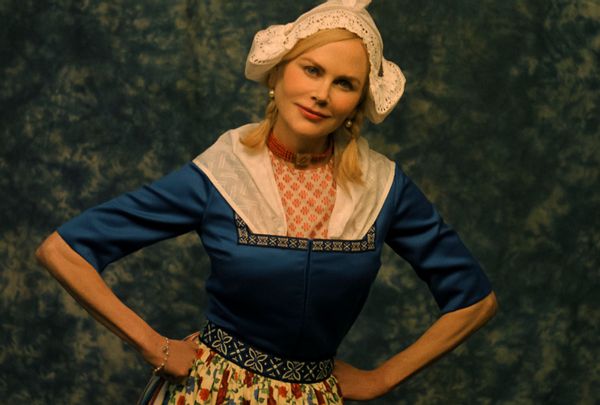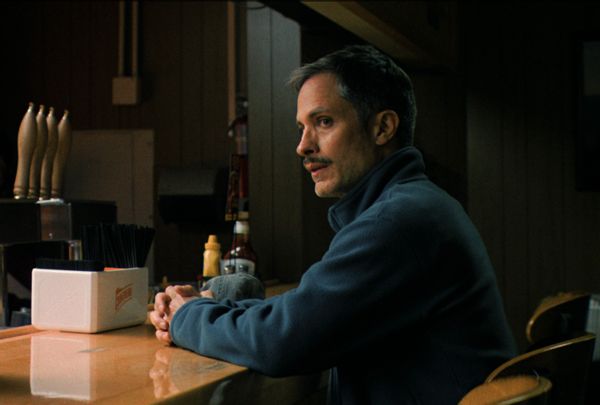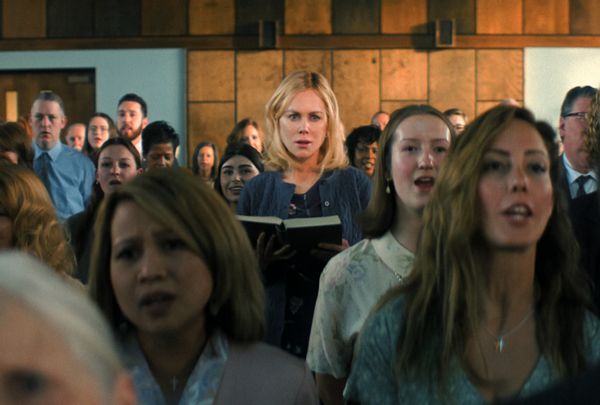
Very few moments in Mimi Cave’s new Nicole Kidman-starring thriller “Holland” could be deemed “brilliant.” The film has a hard enough time as it is just trying to scrape past decent, barely ever producing the thrills that the movie’s subgenre promises, despite its fervent attempts to create suspense out of thin air. Even with a performer as adept as Kidman in the lead role, the film's slapdash script only lets her do so much. Most of the time, she’s left to idly chew the scenery falling to bits around her.
But for a single shining moment, a solitary spark in the darkness, “Holland” transcends its feeble state and becomes a delight — with some key assistance from a delicious Danish pastry.
Just before this brief moment of confectionery radiance, Kidman’s character, Nancy Vandergroot, a turn-of-the-millennium Midwestern mom, is preoccupied by the fear that her husband Fred (Matthew Macfadyen) is cheating on her while he’s away on business trips. Nancy wants to get to the bottom of it, so after work one day, she meets her friend Dave (Gael García Bernal) — a fellow teacher at the local high school in Holland, Michigan — to draw up a scheme at their favorite diner. They decide that Dave will schedule an appointment at Fred’s optometry practice and leave the bathroom window unlatched for Nancy to crawl through under the cover of night. Once she’s in, she’ll snoop for hard evidence of Fred’s infidelity, something he wouldn’t dare bring home with him in case Nancy gets eyes on it.
It’s a sweet plan, but not as sweet as the crullers that the diner waitress brings out for the plotting pair: a glazed cruller for Dave and a chocolate one for Nancy. Before the waitress can even tell them to enjoy their food, Nancy takes a hard look at the deep-fried dough in front of her and exclaims, “Nice!” It’s as if Nancy completely forgot that she ordered anything at all, and the arrival of her pastry was a complete surprise. It’s such a strange, outwardly hilarious delivery on Kidman’s part, heaved from the back of her mouth and coated in a wonky Midwestern accent, that it got the biggest laugh out of me of any line in the movie, which never manages to recreate this peculiar magic.
That “Holland” doesn’t lean harder into Nancy’s eccentricities is its biggest flaw. In Kidman, a cleverly freaky performer whose finest films have been the product of a close working relationship with her directors, Cave has putty in her hands to mold her movie into the best possible version of itself. But instead of plying, pulling and pushing, Cave seems distracted by trying to make her colorful directorial vision align with Andrew Sodroski’s pallid script, with Kidman left to pull out inspired bits of pastry-driven character work where she can. For a film that recalls Kidman’s past roles and meets her in this present artistic moment — where she’s been deftly juggling prestige with frothier mainstream projects — “Holland” should be a coup. Instead, the film wastes the story’s bizarre bones and settles for being frustratingly predictable, forgetting the best thing about Kidman’s presence: She’s great at playing a total freakin’ weirdo.

But what makes that introduction to the world of “Holland” particularly irksome is not just that it’s mistrusting of its audience, but that it’s also mistrusting of the film itself. This opening bit of narration is a dead giveaway that “Holland” is not confident enough in its very game cast or Cave’s capable direction, and this uncertainty bleeds into the rest of the film’s narrative. The mystery that Cave carves out of Fred’s apparent adultery is so thin that it’s transparent. And though the viewer can see a reveal dangling miles in the distance, Cave insists on toying with their minds anyway. There are stylish but completely unnecessary dream sequences — just one would already be verging on superfluous — and frenzied endeavors to create intrigue where there is none. How many times can Nancy burrow through a box of Fred’s belongings as he draws closer before we just wish she’d be caught so they could get on with the story already?

As Nancy’s torn between being the picture-perfect housewife and the rebellious free thinker, Kidman recalls the sharp-tongued Joanna Eberhart from “The Stepford Wives,” who fought against her community’s robotic femininity until it consumed her. Elsewhere, she dips into Suzanne Stone’s relentless striving in “To Die For,” effectively hitting the few comedic beats in “Holland” with the same coldness Kidman displayed in her breakthrough role. There are even flashes of Grace, the lonely shut-in mother of two in “The Others,” whose belief that her house is haunted causes her slow descent into madness. When Kidman gets to play with Nancy and press into her idiosyncrasies like she’s done in other madcap roles, “Holland” briefly comes alive. But because the film is too burdened trying to keep its clumsy mystery moving in a straight line, it never settles into any one flavor of weirdness long enough for the viewer to enjoy.
The irregularity is almost undoubtedly a result of Sodroski’s script, which is, in no uncertain terms, a mess. After it topped the Black List of industry-favorite unproduced screenplays over a decade ago, the film entered production in 2013 before falling apart and sitting in purgatory for years after. Cave told Variety that she intentionally set her vision of the film in 2000. This decision is one of the best things about “Holland,” which brims with recently retro production design in Windows desktop computers, early cell phones and pagers, tapes rented from video stores and high-rise dad jeans. It also makes Nancy’s suspicions more difficult to disprove, hence the crawl-through-the-window plan instead of, say, unlocking an iPhone — ugh!
But even this imaginative choice isn’t enough to enhance Sodroski’s maladroit script, though Kidman does try. In one scene, while Fred’s away on one of his “trips” and Harry is at a sleepover, Nancy sits in her kitchen alone, eating meatloaf and guffawing at a copy of “Mrs. Doubtfire” she picked up at Blockbuster. It’s the middle of the movie, the scene where Robin Williams’ character is caught peeing standing up, revealing to his kids that he’s in old lady drag. Somehow, Nancy finds out at the same time as them. “She’s a ‘he’!” Nancy says through her laughter. This woman is so naive that she genuinely believes Mrs. Doubtfire is real. Given that this scene is so period-specific, it’s safe to say it probably wasn’t in the original script, and that it’s a small but critical choice on both Cave and Kidman’s part.
Nancy’s adorable gullibility sets her apart from a trite thriller wife. This is the character in the actor’s hands, and it’s the film’s biggest argument for letting “Holland” be the Nicole Kidman showcase it never turns out to be.

Even for its few merits, “Holland” is exasperating because it comes so close to taking advantage of Kidman’s penchant for weirdness but never runs away with it in the way that something like the character-focused “Babygirl” does. Cave’s film would unquestionably be more successful if it encouraged Kidman to use her full array of quirks. This puzzle is already missing so many pieces that letting Kidman come in and retrofit it with her own handcrafted parts would only make it a more interesting finished work. There’s more beauty and fascination in an imperfect film that surrenders to its flaws — and urges its artists to build around them — than there is in a film that spends time trying to outrun those shortcomings. If all of “Holland” were as kooky as Nancy’s impassioned reaction to her chocolate cruller, audiences would be in for a far more delicious treat.







